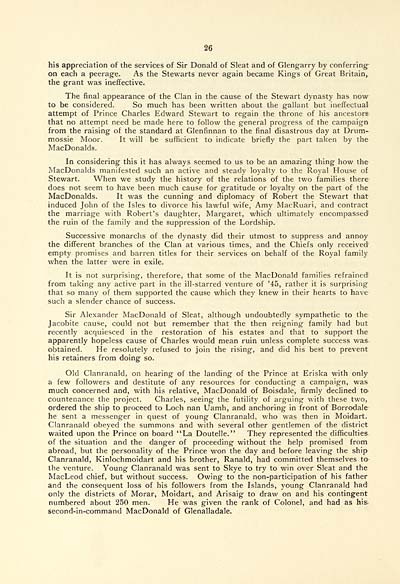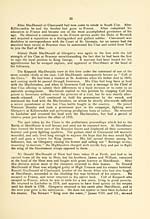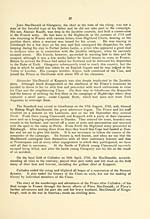Organisations > Clan Donald roll of honour
(30) Page 26
Download files
Complete book:
Individual page:
Thumbnail gallery: Grid view | List view

26
his appreciation of the services of Sir Donald of Sleat and of Glengarry by conferring
on each a peerage. As the Stewarts never again became Kings of Great Britain,
the grant was ineffective.
The final appearance of the Clan in the cause of the Stewart dynasty has now
to be considered. So much has been written about the gallant but ineffectual
attempt of Prince Charles Edward Stewart to regain the throne of his ancestors
that no attempt need be made here to follow the general progress of the campaign
from the raising of the standard at Glenfinnan to the final disastrous day at Drum-
mossie Moor. It will be sufficient to indicate briefly the part taken by the
MacDonalds.
In considering this it has always seemed to us to be an amazing thing how the
MacDonalds manifested such an active and steady loyalty to the Royal House of
Stewart. When we study the history of the relations of the two families there
does not seem to have been much cause for gratitude or loyalty on the part of the
MacDonalds. It was the cunning and diplomacy of Robert the Stewart that
induced John of the Isles to divorce his lawful wife, Amy MacRuari, and contract
the marriage with Robert's daughter, Margaret, which ultimately encompassed
the ruin of the family and the suppression of the Lordship.
Successive monarchs of the dynasty did their utmost to suppress and annoy
the different branches of the Clan at various times, and the Chiefs only received
empty promises and barren titles for their services on behalf of the Royal family
when the latter were in exile.
It is not surprising, therefore, that some of the MacDonald families refrained
from taking any active part in the ill-starred venture of '45, rather it is surprising
that so many of them supported the cause which they knew in their hearts to have
such a slender chance of success.
Sir Alexander MacDonald of Sleat, although undoubtedly sympathetic to the
Jacobite cause, could not but remember that the then reigning family had but
recently acquiesced in the restoration of his estates and that to support the
apparently hopeless cause of Charles would mean ruin unless complete success was
obtained. He resolutely refused to join the rising, and did his best to prevent
his retainers from doing so.
Old Clanranald, on hearing of the landing of the Prince at Eriska with only
a few followers and destitute of any resources for conducting a campaign, was
much concerned and, with his relative, MacDonald of Boisdale, firmly declined to
countenance the project. Charles, seeing the futility of arguing with these two,
ordered the ship to proceed to Loch nan Uamh, and anchoring in front of Borrodale
he sent a messenger in quest of young Clanranald, who was then in Moidart.
Clanranald obeyed the summons and with several other gentlemen of the district
waited upon the Prince on board "La Doutelle." They represented the difficulties
of the situation and the danger of proceeding without the help promised from
abroad, but the personality of the Prince won the day and before leaving the ship
Clanranald, Kinlochmoidart and his brother, Ranald, had committed themselves to
the venture. Young Clanranald was sent to Skye to try to win over Sleat and the
MacLeod chief, but without success. Owing to the non-participation of his father
and the consequent loss of his followers from the Islands, young Clanranald had
only the districts of Morar, Moidart, and Arisaig to draw on and his contingent
numbered about 250 men. He was given the rank of Colonel, and had as his.
second-in-command MacDonald of Glenalladale.
his appreciation of the services of Sir Donald of Sleat and of Glengarry by conferring
on each a peerage. As the Stewarts never again became Kings of Great Britain,
the grant was ineffective.
The final appearance of the Clan in the cause of the Stewart dynasty has now
to be considered. So much has been written about the gallant but ineffectual
attempt of Prince Charles Edward Stewart to regain the throne of his ancestors
that no attempt need be made here to follow the general progress of the campaign
from the raising of the standard at Glenfinnan to the final disastrous day at Drum-
mossie Moor. It will be sufficient to indicate briefly the part taken by the
MacDonalds.
In considering this it has always seemed to us to be an amazing thing how the
MacDonalds manifested such an active and steady loyalty to the Royal House of
Stewart. When we study the history of the relations of the two families there
does not seem to have been much cause for gratitude or loyalty on the part of the
MacDonalds. It was the cunning and diplomacy of Robert the Stewart that
induced John of the Isles to divorce his lawful wife, Amy MacRuari, and contract
the marriage with Robert's daughter, Margaret, which ultimately encompassed
the ruin of the family and the suppression of the Lordship.
Successive monarchs of the dynasty did their utmost to suppress and annoy
the different branches of the Clan at various times, and the Chiefs only received
empty promises and barren titles for their services on behalf of the Royal family
when the latter were in exile.
It is not surprising, therefore, that some of the MacDonald families refrained
from taking any active part in the ill-starred venture of '45, rather it is surprising
that so many of them supported the cause which they knew in their hearts to have
such a slender chance of success.
Sir Alexander MacDonald of Sleat, although undoubtedly sympathetic to the
Jacobite cause, could not but remember that the then reigning family had but
recently acquiesced in the restoration of his estates and that to support the
apparently hopeless cause of Charles would mean ruin unless complete success was
obtained. He resolutely refused to join the rising, and did his best to prevent
his retainers from doing so.
Old Clanranald, on hearing of the landing of the Prince at Eriska with only
a few followers and destitute of any resources for conducting a campaign, was
much concerned and, with his relative, MacDonald of Boisdale, firmly declined to
countenance the project. Charles, seeing the futility of arguing with these two,
ordered the ship to proceed to Loch nan Uamh, and anchoring in front of Borrodale
he sent a messenger in quest of young Clanranald, who was then in Moidart.
Clanranald obeyed the summons and with several other gentlemen of the district
waited upon the Prince on board "La Doutelle." They represented the difficulties
of the situation and the danger of proceeding without the help promised from
abroad, but the personality of the Prince won the day and before leaving the ship
Clanranald, Kinlochmoidart and his brother, Ranald, had committed themselves to
the venture. Young Clanranald was sent to Skye to try to win over Sleat and the
MacLeod chief, but without success. Owing to the non-participation of his father
and the consequent loss of his followers from the Islands, young Clanranald had
only the districts of Morar, Moidart, and Arisaig to draw on and his contingent
numbered about 250 men. He was given the rank of Colonel, and had as his.
second-in-command MacDonald of Glenalladale.
Set display mode to: Large image | Transcription
Images and transcriptions on this page, including medium image downloads, may be used under the Creative Commons Attribution 4.0 International Licence unless otherwise stated. ![]()
| Rolls of honour > Organisations > Clan Donald roll of honour > (30) Page 26 |
|---|
| Permanent URL | https://digital.nls.uk/100225132 |
|---|---|
| Description | Listed alphabetically. |
|---|

